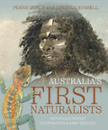 838207538140276596.jpg
838207538140276596.jpg
 Australia's First Naturalists : Indigenous Peoples’ Contribution to Early Zoology
multi chapter work
Australia's First Naturalists : Indigenous Peoples’ Contribution to Early Zoology
multi chapter work
 838207538140276596.jpg
838207538140276596.jpg
 Australia's First Naturalists : Indigenous Peoples’ Contribution to Early Zoology
multi chapter work
Australia's First Naturalists : Indigenous Peoples’ Contribution to Early Zoology
multi chapter work
'Would Blaxland, Wentworth and Lawson have ever crossed the Blue Mountains without the help of the local Aboriginal people? The invaluable role of local guides in this event is rarely recognised. As silent partners, Aboriginal Australians gave Europeans their first views of iconic animals, such as the Koala and Superb Lyrebird, and helped to unravel the mystery of the egg-laying mammals: the Echidna and Platypus. Well into the twentieth century, Indigenous people were routinely engaged by collectors, illustrators and others with an interest in Australia's animals. Yet this participation, if admitted at all, was generally ƯƯbarely acknowledged. However, when documented, it was clearly significant. Penny Olsen and Lynette Russell have gathered together Aboriginal peoples' contributions to demonstrate the crucial role they played in early Australian zoology. The writings of the early European naturalists clearly describe the valuable knowledge of the Indigenous people of the habits of Australia's bizarre (to a European) fauna. Australia's First Naturalists is invaluable for those wanting to learn more about our original inhabitants' contribution to the collection, recognition and classification of Australia's unique fauna. It heightens our appreciation of the previously unrecognised complex knowledge of Indigenous societies.' (Publication summary)
Contents: Introduction -- Acknowledgements -- Chapter 1: Pre-European: Australia's first naturalists -- Chapter 2: Naturalists: 1788-1837 -- Caley and Moowattin -- Chapter 3: Naturalists: 1838-1887 -- Gould, Natty, Jemmy & Gilbert -- MacGillivray, Neinmal & Paida and Kennedy & Galmarra -- Blandowski, Krefft & the Nyeri Nyeri -- Chapter 4: Naturalists 1888-1939 -- The Horn Scientific Expedition & Peter & Harry -- Spencer, Gillen & an Army of women and children -- Finlayson, Butcher, Jimmy & various women & man -- Chapter 5: Epilogue Contemporary Aboriginal and Torres Strait Islander Land and Sea Managers -- Notes -- List of illustrations -- index of Native Species.
'What does it mean to really know an ecosystem? To name all the plants and animals in a place and understand their interactions? To feel an embodied connection to Country? To see and hear in ways that confirm and extend that knowledge?' (Introduction)
'What does it mean to really know an ecosystem? To name all the plants and animals in a place and understand their interactions? To feel an embodied connection to Country? To see and hear in ways that confirm and extend that knowledge?' (Introduction)